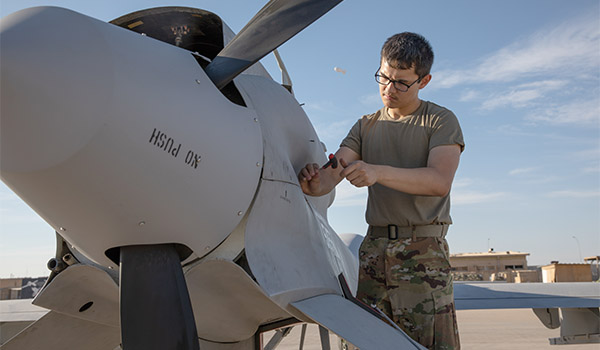
Sergeant Major of the Program Executive Office Aviation / By SGM R. Woody Sullivan: The project management offices across Program Executive Office Aviation support aviators in the field with the development, design, delivery and support of all aviation systems and subsystems across the U.S. Army.

PFC Kenneth Duncan, an Unmanned Aircraft Systems Repairer (15E) assigned to Delta Company, 82nd Aviation Regiment in the Middle East performs a post flight maintenance check on an unmanned aircraft system, Gray Eagle, on May 3, 2020./ U.S. ARMY PHOTO BY SGT SYDNEY MARIETTE, 34TH EXP. CBT. AVN. BDE.
They are staffed with officers, civilians, and contractors, most of them with an aviation background. However, enlisted aviators were barely represented in the ranks.
PEO Aviation is always looking for new and inventive ways to complete our mission; the status quo is not sufficient. As a result, we have taken many steps to operationalize our project management offices (PMOs). One initiative in particular is paying significant dividends in the design and development of our portfolio.
PMO Senior NCOs
Starting in 2018, PEO Aviation leaders lobbied Army Aviation Branch to assign a senior non-commissioned officer to each project office to provide enlisted subject matter expertise to the acquisition support systems and in the early stages of aviation system design, development and support.
Working in program, fleet, and logistical management, these NCOs are assisting in fielding new methods of maintenance and updated publications along with attending unit post-deployment after action reviews (AAR), executive reviews and new system operational testing. They provide a better understanding of how the aviation systems are employed by providing context, breaking down barriers between the PEO and units and providing immediate feedback to the project officers.
The NCOs support the product offices and play a vital role in how the Army equips and supports the Aviation War-fighter. NCOs coming from operational assignments bring vital experience with the employment of systems at all echelons. They have a profound understanding of real world constraints on daily operations, both stateside and while executing missions worldwide. This understanding assists in the development of systems by highlighting components or upgrades that the end user may find ineffective, cumbersome or too difficult to maintain in the field before the system or component is released for testing. This added insight and operational experience provides valuable input to the initial engineering process and helps condense developmental timelines and saves the Army money.
In the Unmanned Aircraft Systems Project Office, this knowledge and real world experience is shared during site visits with contractors from companies that build UASs of all sizes for the Army. This valuable insight helps to drive the development and capabilities of future Army UAS by providing current operational feedback with engineers and program managers of the contracted companies. Site visits during development and testing of future UASs assist in creating a more informed conversation between industry and those developing the UAS of the future.
Direct Link to Enlisted Warfighter
NCOs serving in the project offices also provide a vital link between the product managers and the enlisted Warfighter. As the senior enlisted advisor to the project manager, NCOs serve as a great conduit of information flow by providing feedback and areas of concern during back briefs to the product manager. They achieve this through small group AARs and individual touchpoints during site visits. These visits are critical to successful programs before, during, and after all stages of the UAS program life cycle.
NCOs within the UAS Project Office are an additional resource for product managers to use when covering multiple touchpoints and visits across multiple programs. As an added benefit, the NCOs’ vast experience working alongside Soldiers gives them an advantage when collecting honest, relevant feedback from Soldiers and leaders at all levels from platoon through brigade. The NCOs take this feedback and compile it into a focused Soldier feedback statement that highlights the Soldiers’ thoughts, wants, needs and issues. The statement is used to help inform key developmental and sustainment decisions and assists in developing better products, procedures and capabilities for Soldiers.
Lines of Communication
The NCOs also develop positive lines of communication with engineers, logisticians, and trainers across all of the programs that they support. These lines of communication allow the NCO to offer another key service: direct support to the Warfighter. This direct support gives Soldiers in the field experiencing issues or with urgent concerns relative to their system a quick point of contact within the project office. The NCOs direct the issue to the correct subject matter expert and ensure the issue is resolved in a timely and efficient matter. Handling these issues quickly and efficiently ultimately leads to increased mission readiness and reduced Soldier frustration. Another benefit the NCOs bring by nature of their position is the ability to bring any serious or urgent issues the Soldiers may have directly to the product manager or the respective project manager for quick resolution.
The NCOs assigned to PEO Aviation also assist me in strengthening the bonds between the PEO and the Aviation Center of Excellence at Fort Rucker. Their personal and professional connections at the AVCOE facilitate conversations between our organizations.
This PEO Aviation initiative has been very successful and is paying significant dividends. Having NCOs embedded in the product offices provides a critical service to all aspects of a program from development through end of service by providing crucial input and feedback from the end-user. These NCOs ensure the Soldiers’ voices are heard and provide a critical open line of communication between product offices and Soldiers in the field.
SGM R. Woody Sullivan is the sergeant major of the Program Executive Office, Aviation at Redstone Arsenal, AL; SFC Jason Prunty was a major contributor to the article.










